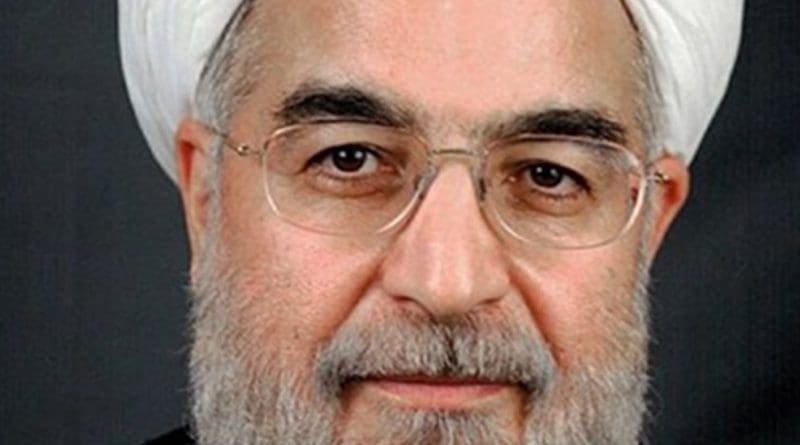Rouhani Fails To Convince As MPs Demand Answers – OpEd
By Arab News
By Camelia Entekhabifard*
Iran’s finance minister was sacked by parliament on Sunday as a direct consequence of the government’s struggle to manage the economic crisis that has become a major threat to the regime. Government members have pointed their fingers at US President Donald Trump and blamed his withdrawal from the nuclear deal and newly reimposed sanctions as the main reason for Iran’s hardship and its collapsing economy.
President Hassan Rouhani also appeared before the parliament on Tuesday to answer members’ questions on the state of the economy, as the MPs wanted to hear Rouhani’s plan of action for when the more stringent US sanctions on oil hit on Nov. 4. Instead the president mainly focused on the good relations he has with the parliament and the entire establishment and how he can expand these ties. There was not much about his government’s plan of action for addressing the upcoming sanctions or how he can improve the economy based on the current circumstances. Basically, Rouhani did all he could to prevent his own impeachment rather than try to convince the ordinary Iranians that he is doing his best to improve their living conditions. The MPs were not satisfied with the president’s explanations, and I doubt the public will be either.
Interestingly, at the beginning of the session Rouhani said that the White House would not be happy with the outcome. Perhaps he meant that the MPs wouldn’t embarrass him with the sort of questions that would please the nation’s enemy.
If Rouhani can survive the fallout from this grilling and parliament does not impeach him, then his next foreign trip will be to the UN next month. Rouhani and Foreign Minister Mohammed Javad Zarif are due to attend the organization’s 73rd General Assembly in New York, but mainly with the aim of finding a way of avoiding the next round of US sanctions. Zarif says the US is waging “psychological war” against Iran.
For them, the US dishonored the nuclear accord, but Trump has said many times that he is willing to reach a better and more comprehensive deal if the Iranians are ready to come to the negotiation table. However, Islamic Revolutionary Guard Corps members and their associates are already whispering of a betrayal conducted by government members during the original nuclear talks and in the agreement.
Rouhani is currently facing two crises — one internal and one external. The domestic one is related to public anger and the citizens’ demands and frustrations over his failed attempts to improve their economic hardship, which could easily soon turn the nation against the regime.
The external crisis is related to Iran’s foreign interferences and its commitments toward Hezbollah members in Lebanon as well as Hamas, and its support of Bashar Assad and his army in Syria.
Outsiders see Rouhani as powerless when it comes to regional policy, and some Western powers believe he does not control the IRGC. But it seems the current US administration sees the hard-liners and the so-called moderates as two sides of the same coin and so treats them equally. For Trump, all of the regime’s members represent the system, regardless of their political affiliation. He wants to talk to them and he’s clear about his requirements — the rest is up to them.
If Rouhani and his team are counting on the US midterm elections, which will be held on Nov. 6, and Trump’s current domestic crisis to work in their favor, then they are wrong. Trump will re-impose the oil sanctions two days ahead of the elections and they will affect Rouhani’s government before the results of the votes are known.
Spending time with the Chinese and Russians is a new trend for the Iranian regime’s members, as they are counting on their support when the sanctions come into effect. From giving a big chunk of the Caspian Sea to Russia and its neighbors to allowing Chinese fishing boats to trawl the floor of the Arabian Gulf and Gulf of Oman, the clerics have been handing out gifts to their supporters, but news of these concessions have given the people even more reason to hate the regime and their foreign supporters.
Rouhani and Zarif are going to New York not just to address the UN General Assembly, but are looking to seize their last chance to see if they can change Trump’s mind about the oil sanctions. Astonishingly, the US last week refused an offer from Russia that would have seen a rollback of Iranian troops in Syria in return for a waiver of the oil sanctions — despite Israeli calls for an immediate withdrawal. Trump’s national security adviser John Bolton said the White House had rejected the Russian proposal.
President Trump is not a backchannel person: He wants direct talks with Iran.
*Camelia Entekhabifard is an Iranian-American journalist, political commentator and author of “Camelia: Save Yourself By Telling the Truth” (Seven Stories Press, 2008). Twitter: @CameliaFard

